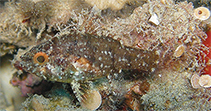| Family: |
Apogonidae (Cardinalfishes), subfamily: Apogoninae |
| Max. size: |
3.5 cm SL (male/unsexed) |
| Environment: |
reef-associated; marine; depth range 0 - 82 m |
| Distribution: |
Indo-Pacific: from East Africa and the Red Sea to French Polynesia; north to Japan and south to Australia. |
| Diagnosis: |
Dorsal spines (total): 9-9; Dorsal soft rays (total): 9-9; Anal spines: 2-2; Anal soft rays: 8-8; Vertebrae: 24-24. This species is distinguished by the following characters: usually 8-12 pored lateral-line scales and 13-15 gill rakers and rudiments; body scales margins uniform to pale edging; body mottled brownish with 5 darker irregular bars, the first anterior to origin of first dorsal fin, the second bar from posterior half of first dorsal fin through posterior half of pelvic fin, the third narrow bar between soft dorsal and soft anal fins, the fourth on caudal peduncle, and the fifth at base of caudal fin; axil of pectoral fin with a whitish spot; 3 whitish basicaudal spots partially in darkish basicaudal bar; whitish spot behind posterior base of soft dorsal fin; second dorsal fin, anal fin and caudal fin pale with darkish banding (Ref. 93673). |
| Biology: |
Nocturnal species; occurs inshore (Ref. 7300). Enters estuaries and quiet coastal bays, usually on mud or silty substrate with algae-rock outcrops or isolated soft corals (Ref. 48635). Solitary or in small groups (Ref 90102). |
| IUCN Red List Status: |
Least Concern (LC); Date assessed: 14 February 2022 Ref. (130435)
|
| Threat to humans: |
harmless |
Source and more info: www.fishbase.org. For personal, classroom, and other internal use only. Not for publication.
